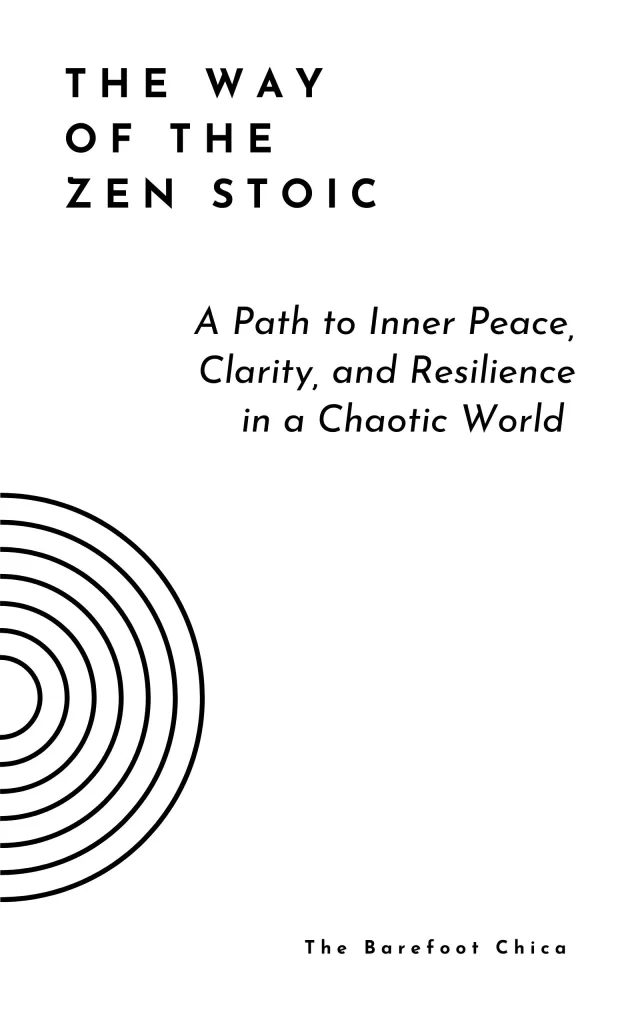The Way of the Zen Stoic: Finding Balance in a Chaotic World
The Way of the Zen Stoic: Finding Balance in a Chaotic World.
In our fast-paced, ever-changing world, it’s easy to feel overwhelmed. Stressors pile up—work deadlines, family responsibilities, societal pressures—and we often find ourselves searching for peace amidst the chaos. But what if the answers weren’t found in external solutions but in timeless wisdom that has guided humanity for centuries?
Enter The Way of the Zen Stoic, a philosophy that combines the flowing harmony of Taoism, the mindful presence of Zen Buddhism, and the rational discipline of Stoicism. Together, these traditions offer a powerful framework for cultivating inner peace, clarity, and resilience in modern life.
This article explores the essence of The Way of the Zen Stoic—what it means, why it matters today, and how you can begin integrating its teachings into your daily life.
What Is The Way of the Zen Stoic?
At its core, The Way of the Zen Stoic is about balance. It’s about harmonizing three ancient philosophies to create a cohesive guide for living well:
- Taoism teaches us to flow with life’s natural rhythms rather than resisting them.
- Zen Buddhism encourages mindfulness and presence in each moment.
- Stoicism equips us with tools to face adversity with courage and rationality.
While these philosophies come from different cultural traditions—Taoism and Zen Buddhism from Eastern thought, Stoicism from Western philosophy—they share common principles. They emphasize acceptance over resistance, self-mastery over external control, and compassion over ego-driven behavior.
The beauty of The Way of the Zen Stoic lies in its adaptability. You don’t need to meditate for hours or live as a hermit to practice these teachings. Instead, they offer practical tools for navigating everyday challenges—whether it’s managing stress, improving relationships, or finding purpose.
Why These Philosophies Matter Today
In an age marked by distractions and uncertainty, ancient wisdom feels more relevant than ever. Here’s why:

1. Cultivating Inner Peace
Stress has become a defining feature of modern life. From endless notifications to societal pressures to “do more,” many people struggle to find calm amidst chaos. Taoism reminds us that peace isn’t something we chase—it’s something we cultivate by aligning with life’s natural flow. When we stop resisting what is and embrace acceptance, we create space for serenity.
Zen Buddhism complements this by teaching mindfulness—the art of being fully present in each moment. Instead of ruminating on past mistakes or worrying about future uncertainties, Zen invites us to anchor ourselves in the here and now.
Stoicism adds another layer by helping us focus on what is within our control (our thoughts and actions) while letting go of what isn’t (external events). This mindset reduces unnecessary stress and empowers us to act with clarity.
2. Building Resilience
Life is unpredictable—and often challenging. Whether it’s dealing with loss, failure, or disappointment, resilience is key to navigating adversity without being consumed by it.
Taoism teaches us to adapt like water flowing around obstacles. Instead of fighting against challenges head-on, we can approach them with flexibility and creativity.
Zen Buddhism encourages non-attachment—not clinging to outcomes or identities that no longer serve us. This perspective helps us let go of what holds us back and move forward with grace.
Stoicism equips us with tools like negative visualization (imagining worst-case scenarios) to prepare ourselves mentally for hardship. By reframing setbacks as opportunities for growth, Stoics cultivate strength even in difficult circumstances.
3. Fostering Connection
Despite living in an era of unprecedented connectivity, loneliness is at an all-time high. Many people struggle to build meaningful relationships amidst superficial interactions.
Taoism emphasizes compassion as one of its core virtues—recognizing that we’re all interconnected within the flow of life. By letting go of ego-driven desires (like controlling others), Taoists create space for authentic connection.
Zen Buddhism teaches deep listening—the practice of being fully present with someone without interrupting or judging them. This mindful approach fosters understanding and empathy.
Stoicism adds a sense of duty: treating others justly and contributing positively to society. Marcus Aurelius reminds us that “What is not good for the hive is not good for the bee,” encouraging us to act with integrity toward others.
How to Practice The Way of the Zen Stoic
Integrating these philosophies into your daily life doesn’t require drastic changes—it starts with small shifts in perspective and action. Here are some practical ways to begin:

1. Embrace Simplicity
Simplify one area of your life—whether it’s decluttering your home or reducing commitments that don’t align with your values. Taoism teaches that simplicity creates space for peace; Zen reminds us that less can be more; Stoicism encourages gratitude for what we already have.
For example, try a simple exercise like letting go of one unnecessary item each day. This small act can help you cultivate a mindset of non-attachment and appreciate what truly matters.
2. Practice Mindfulness
Choose one daily activity (like eating or walking) and do it mindfully for a week. Focus entirely on the experience—its sensations, textures, sounds—without distractions. This Zen practice helps ground you in the present moment while reducing mental clutter.
Mindfulness isn’t just about meditation; it’s about being fully engaged in whatever you’re doing. Try eating a meal slowly, savoring each bite without checking your phone or thinking about the next task.
3. Reflect Daily
Start or end your day with reflection:
- In the morning: What virtues (wisdom, compassion) do I want to embody today? What challenges might arise?
- In the evening: Did I act according to my values? What can I improve tomorrow?
This Stoic exercise builds self-awareness and intentionality over time.
Daily reflection can be as simple as jotting down your thoughts in a journal or taking a few minutes to meditate on your intentions. It helps you stay focused on what truly matters and align your actions with your values.

4. Let Go
Identify one thing you’ve been holding onto—whether it’s an outdated belief or unnecessary possession—and let it go this week. Taoism teaches that letting go creates space for growth; Zen encourages non-attachment; Stoicism reminds us that freedom comes from releasing what we cannot control.
For instance, if you’ve been clinging to a past regret, try writing it down on a piece of paper and burning it symbolically. This act can help you release emotional burdens and move forward with greater clarity.
Women Who Embody The Way
While these philosophies have historically centered male figures like Lao Tzu or Marcus Aurelius, many women have embodied their principles throughout history:
- Sun Bu’er (Taoism): A Taoist master who emphasized inner cultivation and balance.
- Mugai Nyodai (Zen Buddhism): One of Japan’s first female Zen abbesses who broke gender norms through spiritual leadership.
- Ruth Bader Ginsburg (Stoicism): A modern icon who exemplified resilience and justice amidst systemic challenges.
Today’s world continues to see women embracing these teachings—whether through mindfulness advocacy (like Sister Chan Khong) or environmental stewardship (like Jane Goodall).
These women demonstrate that The Way of the Zen Stoic isn’t just a philosophy for personal growth; it’s a path that can inspire positive change in the world.
A Philosophy for Everyone
The Way of the Zen Stoic isn’t just a philosophy—it’s a way of living that benefits both ourselves and others:
- By cultivating inner peace through mindfulness (Zen), we reduce reactivity in conflict.
- By building resilience through acceptance (Taoism), we inspire strength in those around us.
- By acting virtuously through discipline (Stoicism), we contribute positively to society.
Ultimately, this path reminds us that happiness doesn’t come from controlling everything—it comes from aligning ourselves with reality as it is.
Why It Matters in Our Chaotic World Today
In an era marked by global uncertainties, social upheavals, and rapid technological change, The Way of the Zen Stoic offers a grounding force—a way to navigate chaos with grace and resilience. This philosophy becomes even more crucial when we consider the unique challenges faced by women and other marginalized populations.
For Women
Women often face disproportionate pressures in both personal and professional spheres. The expectations of balancing career ambitions with family responsibilities, navigating gender biases in the workplace, and confronting societal expectations about appearance and behavior can be overwhelming. The Way of the Zen Stoic offers several tools to address these challenges:
- Embracing Inner Worth: Stoicism teaches us to focus on our inherent value rather than external validation. This can be particularly empowering for women who often face societal pressures about their appearance or accomplishments.
- Mindful Presence: Zen practices help women stay grounded in the present moment, reducing anxiety about future uncertainties or past regrets. This can be especially helpful in managing the mental load that often falls disproportionately on women.
- Flowing with Change: Taoist principles of adaptability can help women navigate the ever-changing landscape of gender roles and expectations, allowing for a more flexible and less stressful approach to life’s demands.
For Marginalized Populations
Marginalized groups often face systemic barriers, discrimination, and added stressors in daily life. The Way of the Zen Stoic can provide valuable tools for resilience and empowerment:
- Cultivating Inner Strength: Stoic practices of focusing on what’s within one’s control can be particularly empowering for those facing systemic barriers. It allows individuals to channel their energy into personal growth and actionable change rather than being overwhelmed by external circumstances.
- Non-Attachment to Stereotypes: Zen teachings on non-attachment can help individuals free themselves from the weight of societal stereotypes and expectations, allowing for a more authentic expression of self.
- Harmony Amidst Adversity: Taoist concepts of finding harmony even in challenging situations can provide a framework for navigating the complexities of intersectional identities and experiences.
In the Workplace
The modern workplace is often a source of stress and burnout, particularly for women and marginalized groups who may face additional barriers:
- Mindful Leadership: Zen practices can foster more inclusive and compassionate leadership styles, benefiting everyone in the organization.
- Resilience in the Face of Bias: Stoic principles can help individuals maintain their composure and self-worth when confronting workplace biases or microaggressions.
- Adaptability in Changing Industries: Taoist concepts of flow can aid in navigating rapidly changing industries and job markets, reducing stress around job security and career progression.
For Mental Health and Well-being
The mental health challenges faced by many, especially in marginalized communities, can be addressed through this integrated philosophy:
- Stress Reduction: Mindfulness practices from Zen can significantly reduce stress and anxiety, which often disproportionately affect women and marginalized groups.
- Emotional Regulation: Stoic techniques for managing emotions can be particularly helpful for those dealing with the added emotional labor of navigating systemic inequalities.
- Self-Compassion: Taoist acceptance combined with Stoic self-reflection can foster greater self-compassion, countering the harsh self-criticism that many, especially from marginalized groups, often internalize.
In Activism and Social Change
For those engaged in social justice work, The Way of the Zen Stoic offers a sustainable approach to creating change:
- Balanced Activism: By combining Stoic focus on what can be changed with Taoist acceptance of what cannot, activists can work towards change without burning out.
- Mindful Dialogue: Zen practices of deep listening and present-moment awareness can facilitate more productive conversations around difficult social issues.
- Resilient Hope: The philosophy provides tools for maintaining hope and perseverance in the face of slow progress or setbacks in social movements.
In a chaotic world filled with distractions and pressures, The Way of the Zen Stoic offers timeless wisdom for living authentically and meaningfully. By blending Taoist flow, Zen mindfulness, and Stoic discipline into our lives, we can navigate challenges with greater ease—and inspire others along the way.
Whether you’re seeking inner peace or striving to make a positive impact on those around you, this philosophy provides a practical roadmap for achieving both. Start small: reflect daily, embrace simplicity, practice mindfulness—and watch how these teachings transform your life from within.
As you embark on this journey, remember that The Way of the Zen Stoic is not a destination but a path—a continuous process of growth, learning, and self-discovery. By embracing its principles, you can cultivate a life that is more balanced, compassionate, and resilient—a life that truly reflects your highest potential.
Additional Resources:
For those interested in exploring these philosophies further, here are some recommended readings and resources:
- Taoism: “Tao Te Ching” by Lao Tzu
- Zen Buddhism: “Zen Mind, Beginner’s Mind” by Shunryu Suzuki
- Stoicism: “Meditations” by Marcus Aurelius
Online communities and courses can also provide valuable insights and support:
- Reddit Communities: r/Taoism, r/Zen, r/Stoicism
- Coursera Courses: Explore philosophy courses from leading universities








